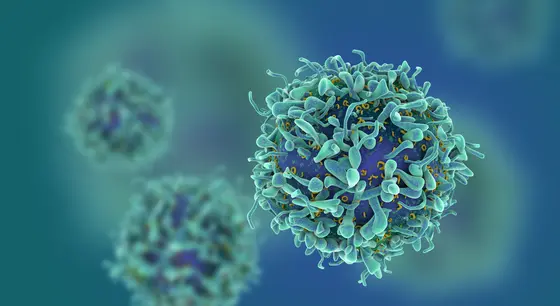Personalized cellular immunotherapies are considered promising new treatment options for various types of cancer. One of the therapeutic approaches currently being tested are so-called “T-cell receptor transgenic T-cells“. The idea behind this: immune T cells from a patient are equipped in the laboratory to recognize the patient's own unique tumor, and then reinfused in large numbers to effectively kill the tumor cells.
The development of such therapies is a complicated process. First, doctors isolate tumor-infiltrating T cells (TILs) from a sample of the patient's tumor tissue. This cell population is then searched for T-cell receptors that recognize tumor-specific mutations and can thus kill tumor cells. This search is laborious and has so far required knowledge of the tumor-specific mutations that lead to protein changes that are recognized by the patients' immune system. During this time the tumor is constantly mutating and spreading, making this step a race against time.
“Finding the right T cell receptors is like looking for a needle in a haystack, costly and time-consuming,“ says Michael Platten, Head of Department at the DKFZ and Director of the Department of Neurology at the University Medical Center Mannheim. “With a method that allows us to identify tumor-reactive T-cell receptors independently of knowledge of the respective tumor epitopes, the process could be considerably simplified and accelerated.“
A team led by Platten and co-study head Ed Green has now presented a new technology that can achieve precisely this goal in a recent publication. As a starting point, the researchers isolated TILs from a melanoma patient's brain metastasis and performed single cell sequencing to characterise each cell. The T cell receptors expressed by these TILs were then individually tested in the lab to identify those that were recognised and killed patient tumor cells. The researchers then combined these data to train a machine learning model to predict tumor reactive T cell receptors. The resulting classifier could identify tumor reactive T cells from TILs with 90% accuracy, works in many different types of tumor, and accommodates data from different cell sequencing technologies.
“predicTCR enables us to cut the time it takes to identify personalised tumor reactive T cell receptors from over three months to a matter of days, regardless of tumor type“ said Ed Green.
“We are now focusing on bringing this technology into clinical practice here in Germany. To finance further development, we have founded the biotech start-up Tcelltech,“ adds Michael Platten. “predicTCR is one of the key technologies of this new DKFZ spin-off.“
C.L. Tan, K. Lindner, T. Boschert, Z. Meng, A. Rodriguez Ehrenfried, A. De Roia, G. Haltenhof, A. Faenza, F. Imperatore, L. Bunse, J.M. Lindner, R.P. Harbottle, M. Ratliff, R. Offringa, I. Poschke, M. Platten and E.W. Green: Tumor-reactive T-cell receptors are rapidly identified from lymphocyte scRNA-seq data.
Nature Biotechnology 2024, DOI: 10.1038/s41587-024-02161-y



